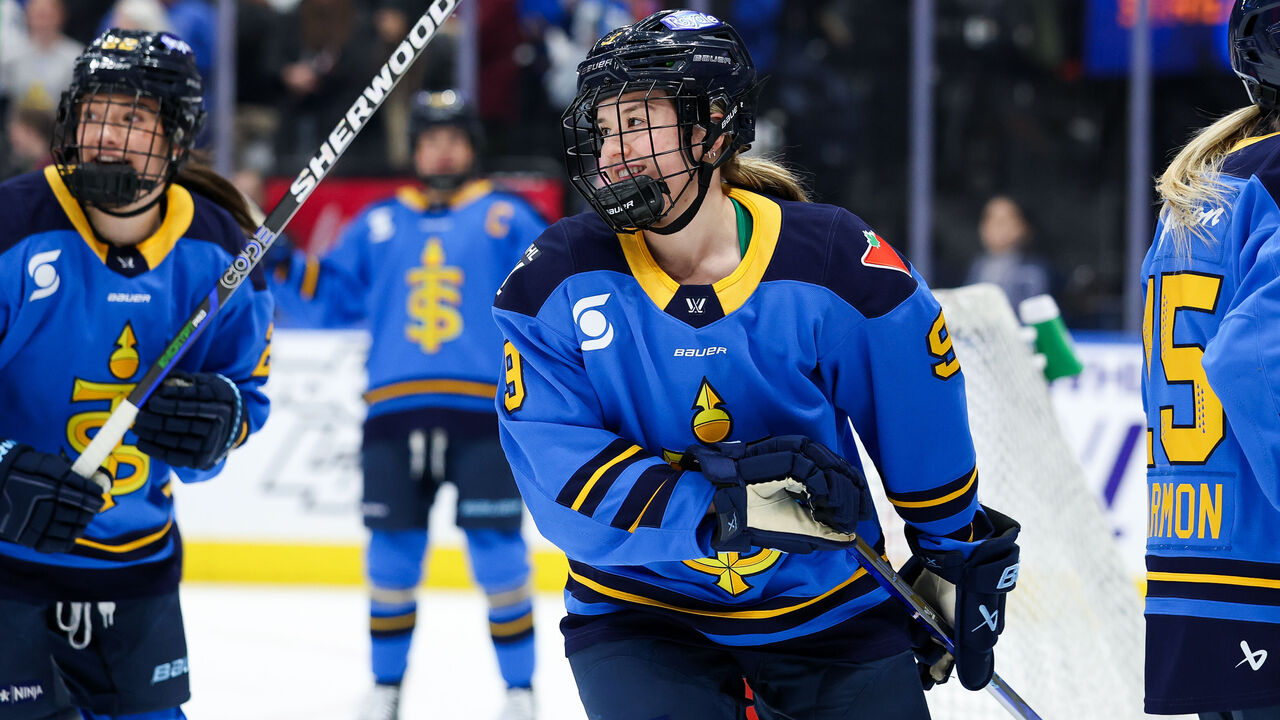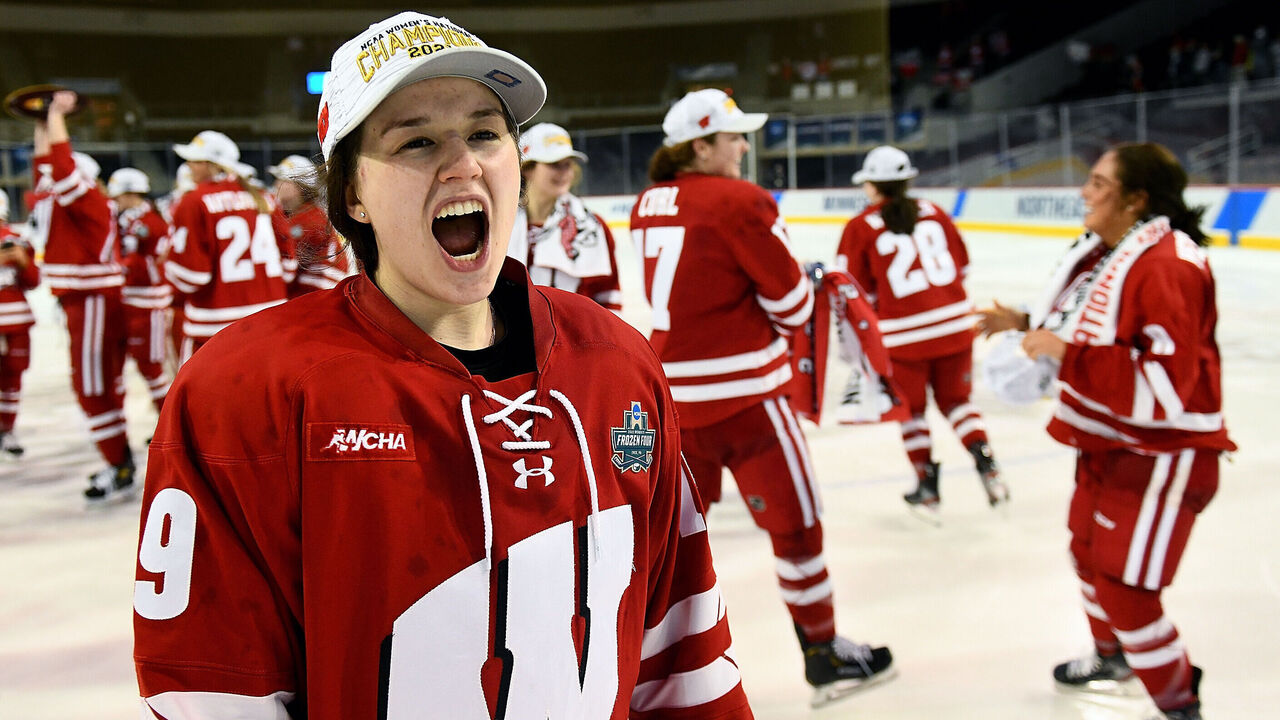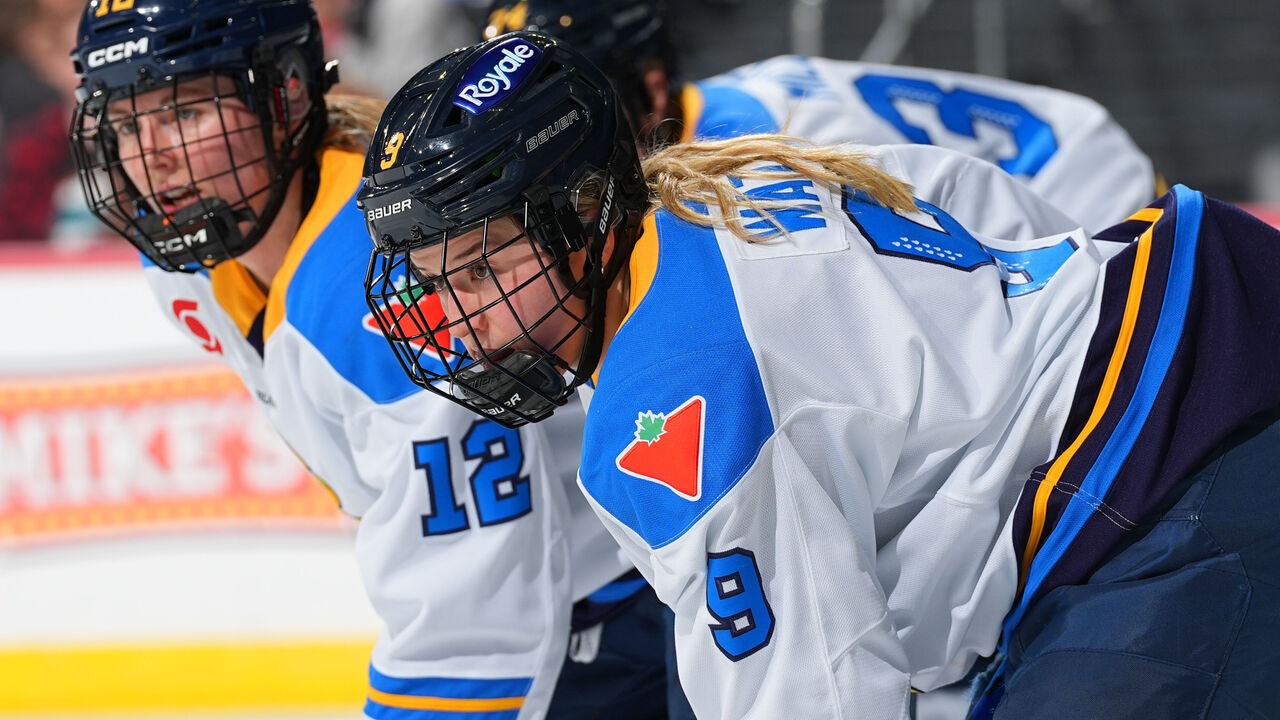Inside Daryl Watts' one-of-a-kind route to hockey stardom
During Women's History Month in March, theScore is publishing stories that illustrate how women in sports lead, inspire change, and navigate their careers.
TORONTO - When Daryl Watts debuted at the pro level as the highest-paid player in women's hockey, she wasn't strong enough to lift the puck to the glass. Muscles in her wrists atrophied over the previous 10 months while she test-drove early retirement from the sport after college. Hanging up her skates blunted her deadeye shot.
The unusual circumstances suited a unique player. Watts was a thrilling college superstar at Wisconsin who clinched a national championship in overtime by banking the puck over the goalie's shoulder from behind the net. When she graduated, she figured the game wouldn't provide a comfortable living. But she set aside a future in commercial real estate in January 2023 to ink the richest contract in the Premier Hockey Federation, the final forerunner to the PWHL.
Nobody in hockey can relate to Watts' career arc. Her record $150,000 salary for the 2023-24 season was voided without warning when the PHF was bought out. Her rusty cameo and middling production in the defunct league lowered her PWHL draft stock. Then she glowed in the maiden year of best-on-best competition and became the first major free agent to test the market and change teams, completing a milestone with no precedent.

To realize her promise and hush doubts, she had to return to playing shape. Watts enlisted the help of Gary Roberts, the retired NHL forward and demanding performance trainer in the Toronto area.
"I'd stopped lifting weights. I was just going on long walks with my dogs. Treadmill. Post-hockey girl activity," Watts told theScore in a recent interview. "Because I had lost so much muscle, I needed a drastic, get-back-to-it workout regime. I reached out to Roberts. I've trained with him now for two-and-a-half years. He built me from no muscle and got me more fit than I'd ever been."
The payoff was immense. Late in Year 2 of the PWHL, Watts ranks third in league scoring with 25 points in 26 games for her hometown Toronto Sceptres. The 25-year-old winger is a rare must-see talent who entered her prime with scant international experience. Canada finally tapped Watts to play at this season's Rivalry Series with the United States and will send her over the boards in significant moments at next month's world championship in Czechia.
Her skill and intellect supercharge top lines. Toronto's first championship pursuit combusted when Natalie Spooner, the PWHL scoring leader and regular-season MVP, suffered an ACL tear in the 2024 playoffs. Watts became an offseason target for Gina Kingsbury, general manager of the Sceptres and the Canadian national team.
"She's got a dynamic step to her skating. She can burn defenders quite easily. She's got a good release. She's got great hands. Great vision," Kingsbury said. "She was one of the athletes we (really wanted) to bring in. We were looking at Spooner being out for half the season. We knew we would need to find and add more offense to our lineup to make sure we could survive and flourish."
Danger spikes when Watts has possession. To bag her first Sceptres goal, she intercepted a breakout pass and kicked her leg to fake a wrist shot before dangling Minnesota Frost goalie Maddie Rooney. To freeze Frost penalty killers in another matchup, she inched toward the slot with the puck, continually threatened to shoot, finally fired from close range, and banged in her own rebound.
"She creates something every time she gets the puck on her stick," Sceptres forward Emma Woods said.
"There's a gift there that's really hard to explain," said Troy Ryan, head coach of Toronto and Team Canada. "When she attacks people, her feet are always moving, and she always has her head up. As a defender, when you're looking at her, I don't think she looks easy to defend. She always looks in control. She looks like she's got momentum and usually is building speed as she touches the puck."
Peers can't replicate some of her mesmerizing plays. Watts sprung teammates on breakaways in recent weeks by threading a three-line feed between Montreal Victoire defenders and saucering a backhand from her knees against the New York Sirens. A stylish wraparound winner that downed the Ottawa Charge in overtime stemmed from Watts calmly sidestepping the opposition to unlock and exploit an opening.
"You'll see players come in with the puck, look to take a shot, and rip it into a shinpad. She's got the patience to wait, find the seam, and then make her pass or her shot," said PWHL broadcast analyst Becky Kellar, the retired Canadian Olympic defender. "She's going to take a split second, move laterally, circle the net, and find a better option. She's got the confidence and poise to be able to do that."
Watts was raised in Toronto's west end, idolized Maple Leafs legend Mats Sundin, skated on a backyard rink as a child, and torched goalies at every level. She's the No. 2 career scorer in the Ontario women's junior league and sits fifth on the NCAA all-time leaderboard, per Elite Prospects. The Patty Kazmaier Award winner as a goal-per-game freshman, Watts paced Boston College in points twice despite feeling like her development stagnated and joy for hockey declined, she told ESPN.
Rejuvenated by transferring to Wisconsin, Watts retrieved a missed shot in overtime of the 2021 national title game and wheeled behind the Northeastern net. Watts paused and flipped the puck off a defender's knee as she crouched to block a passing lane. The clincher eluded and irritated netminder Aerin Frankel, the current Boston Fleet and Team USA starter, who claimed the goal was lucky and unintentional.
"Daryl differentiates herself from a lot of other players," said Brette Pettet, the captain of Wisconsin's championship team. "She watches a lot of hockey, and she knows a lot about the game. It doesn't surprise me at all that she was able to think out of the box to score that goal. Most players would force a pass or try to stuff it past the goalie. Daryl has a special poise and patience to her game that showed in that instance."

Watts wasn't on Canada's veteran-laden 2022 Olympic squad, and she quit hockey for close to a year but reversed course when the PHF salary cap doubled to $1.5 million, then a record figure in women's sports. She chose to publicize her landmark salary with the Toronto Six to inform and inspire college standouts, setting a bar for compensation they could aim to raise.
Watts weathered unexpected turbulence. She looked on the bright side when the sudden buyout of the PHF nixed her contract but unified women's hockey's star talent, transforming the sport. The Charge mined a hidden gem by drafting Watts in the sixth round and deploying her next to Brianne Jenner, the '22 Olympics MVP. Watts' 10 goals - the league's fourth-best haul in the first season - included a hat trick that triggered a comeback over her future team.
She was one of five PWHL free agents, and the only big scorer, who exercised the right last summer to sign with a new club. Watts' pioneering move to the Sceptres on a two-year deal was a coup. She touched off a five-game point streak in January by assisting Sarah Nurse's winner on the power play at Scotiabank Arena, the Leafs' home ice. She pickpocketed a Sirens defender last week, swerved to the slot, and rifled a deceptive wrister across her body to the inside of the post.
As part of her latest multi-goal effort, she beat Frankel with another bank shot.
Winners of 10 of 12 games in February and March, the Sceptres only trail the archrival Victoire in the six-team standings. Vibes are high as the international break and the last push for the Walter Cup Playoffs approach.
"I wanted to go a team where the stars would align. A team that would be a championship contender. A place where I would have an impact, be valued, and help the team win," Watts said. "It was a dream come true for all the right factors to click in my hometown."
When Watts was 10, the highlight of her year was a family vacation to the Vancouver Olympics. The Wattses watched snowboarding and speedskating, and they witnessed the gripping hockey final that a teenaged Marie-Philip Poulin won for the home team with a pair of first-period snipes. The scene - a Canadian sellout crowd cheering triumphant women in an NHL rink - was formative and motivational.
"Probably the best family trip ever," Watts said.
For a long while, the last time Watts donned the maple leaf and engineered offense for her country was at the 2017 Under-18 world championship. Six minutes remained in the gold-medal game in Czechia when she tiptoed to the slot and picked the top left corner to erase a 1-0 U.S. lead. The Ryan-coached Canada squad didn't score again and lost a tearjerker.
Watts contacted Hockey Canada head scout Cherie Piper before the first PWHL season to ask to be evaluated for the senior national team. By measuring production and impact, the league slots players in a pecking order, and Watts outscored and upstaged some Team Canada mainstays. In her Rivalry Series debut, she played in all five games and assisted two opening goals with a slick deke of Frankel and a controlled zone entry.
She wasn't flustered by the Americans' talent, their dogged puck pressure, or the whirlwind pace.
"You're playing with teammates who are so good that it's not like it's harder hockey. It's faster, of course, but I think it's incredibly fun because the skill is so high," Watts said. "Passes are tape-to-tape. It's such a higher level that you can almost do more. There are higher-level concepts. There are more complicated plays. There are more skill plays."

Toronto's high-end offense fell apart when Spooner crumpled into the boards in the first round of the inaugural postseason. Toronto blew a 2-0 series lead to Minnesota while settling for one goal on 65 shots from Games 3-5. Pairing Watts with Hannah Miller, a newly dominant center, jolted the Sceptres' first line and league-leading power play during the final stages of Spooner's rehab and Nurse's ensuing absence with a lower-body injury.
Some college phenoms stutter in the pros. Watts' scoring touch translated to a hard-nosed environment. She withstands contact and initiates it in the corners with a comparable hit count (26, fifth most on Toronto) to Poulin and Sarah Fillier, two swaggering superstars who play with flair and bite.
"I watch (Watts) and she seems to exude confidence," Kellar said. "I think it's partly because she can find open ice. It's like Mitch Marner: Why does someone that small not just get creamed every time he touches the puck? But they can't catch him because he's very elusive. She's a little bit like that, I find. She'll step to the middle, slow down, speed up. It's allowed her to succeed in a league where the physicality has taken away from a lot of the skilled players - or did initially, especially last year."
The Sceptres hope to help Watts evolve into a complete winger who chips pucks, maintains sound positioning, and demonstrates shrewd judgment. Ryan's seen her make subtly wise decisions, like executing a simple pass in the neutral zone or along the wall, that drain the defense over the course of a shift.
"She's seldom trying to engage in one-on-one situations in dangerous areas. She doesn't mind tucking the puck, driving wide, using her speed, and being really creative down below the top of the circle. She can do whatever she wants down there," Ryan said. "When she's in trouble in the corner, she doesn't try to overextend her possession. She realizes there's a release option behind the net or high. She takes that and re-establishes her offense."
Being an efficient finisher is a work in progress. The analytics the Sceptres track place Watts near the top of the PWHL in individual Grade-A scoring chances, Ryan said. But 15 of the 20 forwards who've buried the most goals around the league this season boast a higher shooting percentage.
Bolstered by four goals in her last three games, Watts' 11.4% scoring rate is hardly an eyesore. Teammates tap in some of her rebounds, Ryan pointed out, and timely tallies punctuate her growing highlight reel. Between the world championship in April, the PWHL playoffs in May, and presumably next year's Olympics, Watts will have chances to pump rubber on net and author a signature moment.
"You think of one of those clutch players and someone you want in big games," Pettet said. "Anyone who knows Daryl or played against her knows that she's a threat on the ice."
Nick Faris is a features writer at theScore.